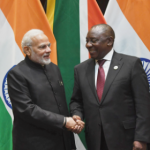This is the transcript of a speech that the author gave at an Interactive Session with Reginah Makgabo Mahaule, Deputy Minister of International Relations, South Africa hosted by Research and Information System for Developing Countries (RIS). Click here to view details of the event.
- A view from the trenches: working in Pretoria, be it as a high official or a foreign Ambassador, one obtains a global view of international affairs. Hence this is an invaluable occasion for us to interact with a top policymaker who manages the foreign policy machine of South Africa.
- South Africa has a holistic view of the world, probably the only African country to do so, especially now as it begins to serve again as a non-permanent member of the UN Security Council. South Africa’s role at the UN, NAM, G20, AU and SADC, BRICS/IBSA and IORA is of particular relevance for us.
- Today is not the time for us to examine and analyse South Africa’s foreign policy: rather this is a great opportunity to listen to the visiting dignitary. I trust we may have a chance to put a few questions later.
- The backdrop is important. The Deputy Minister and her team are no doubt fully engaged in preparing for the forthcoming visit of President Ramaphosa to India. It may seem that he comes as an ‘accidental’ chief guest, but this is not so. He will be India’s most honoured and welcome chief guest at the Republic Day celebrations.
- I wish to offer a few considered suggestions and pointers focused on how to bring additionality to the already close, cordial and cooperative relationship that exists between India and South Africa since long:
- On the bilateral plane, our special focus should be on deepening economic cooperation in all its facets. Following an excellent business summit in Johannesburg last year, the two governments spoke about a joint action plan to implement mutual understandings. We need to pursue this further, and we need to be briefed about the progress achieved so far.
- In addition, it is suggested that our bilateral dialogue should focus on the new area of Blue Economy where considerable complementarities could be created.
- BRICS, now in its second decade, has been doing fairly well. However, its credibility would increase once its New Development Bank begins to fund a few projects in SADC and BIMSTEC regions. Is this likely in the near future?
- The flame of IBSA has been kept alive by the foreign ministers of the three countries – India, Brazil and South Africa. When will they succeed in persuading their top leaders to agree to hold the next IBSA summit?
- Under South Africa’s proactive leadership, IORA has consolidated gains, in line with the work of the three previous chairs: Indonesia, Australia and India. We shall look forward to hearing a bit more about the Working Group on Maritime Safety and Security, the Working Group on Blue Economy, and how the newly adopted Guidelines on engagement with the Observers may help IORA to implement a few high visibility projects.
- We should welcome South Africa’s heightened interest in Asia, but we hope it will follow a judiciously calibrated and balanced policy and in will keep in view the essential diversity and multipolarity of the Asian continent.
- Huge potential remains untapped for optimising the work of Think Tanks which wish to assist policymakers in the two countries. We need to take and sustain an initiative under which five think tanks on each side are linked on a common platform to hold periodic dialogues and manage joint research. The important consideration should be to adopt an inclusive approach, and adequate funding support.
- On public diplomacy, the South High Commission in Delhi and the Indian High Commission in Pretoria could perhaps do more to engage with senior former diplomats and other experts having experience of work in the two countries. It is an asset waiting to be exploited.
- Finally, to sensitise our young generations about the heritage bequeathed to us by our iconic leaders – Gandhi and Mandela, a series of public lectures in each country, to be delivered by the experts of the other country, should be instituted.
Rajiv Bhatia is Distinguished Fellow, Foreign Policy Studies, Gateway House
These remarks were given at an Interactive Session with Reginah Makgabo Mahaule, Deputy Minister of International Relations, South Africa hosted by Research and Information System for Developing Countries (RIS). Click here to view details of the event.
For interview requests with the author, or for permission to republish, please contact outreach@gatewayhouse.in.
© Copyright 2019 Gateway House: Indian Council on Global Relations. All rights reserved. Any unauthorized copying or reproduction is strictly prohibited


